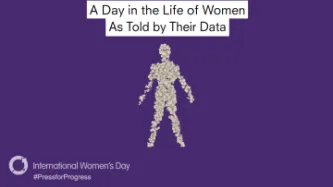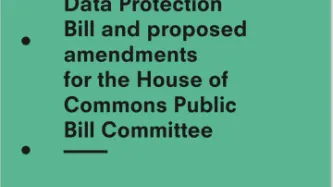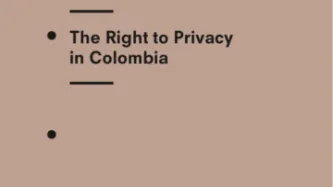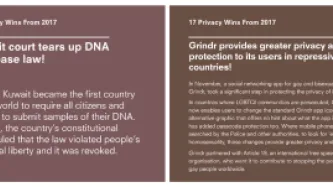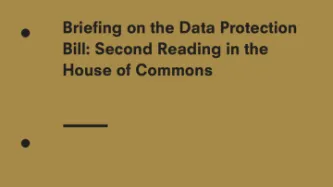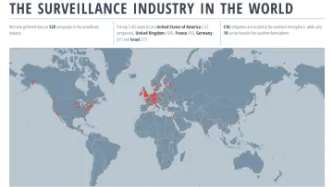Search
Content type: Long Read
The ongoing Facebook and Cambridge Analytica scandal is a wake-up call for UK policy-makers who too often encourage and promote digital industries over the protection people’s personal data. The scandal has shown that the public is concerned by companies’ exploitation of their data. The current lack of transparency into how companies are using people’s data is unacceptable and needs to be addressed.
Reform should not be limited to the behaviour of individual companies. Consumers are confronted…
Content type: News & Analysis
Estos últimos días hemos conocido los detalles de cómo Cambridge Analytica fue capaz de acumular información sobre votantes, a través de una aplicación que recogió datos de más de 50 millones usuarios de Facebook, incluyendo 30 millones de perfiles sicográficos.
Esta es otra historia más de cómo se explotan datos para obtener ventajas políticas. Acá estamos frente a tres historias diferentes:
· Por una parte, partidos políticos y gobiernos continúan intentando acceder a toda la información…
Content type: Long Read
Over the past few days we've all learned details about how Cambridge Analytica was able to amass data on voters through the use of an app that would gather data on approximately 50 million Facebook users, including 30 million psychographic profiles.
This is three stories in one.
Yes, this is another story of data that has been exploited for political advantage, again. Political parties and governments continue to want access to social media intelligence and continue to develop profiles…
Content type: Long Read
Image: Eric Jones
The UK government last week hosted hundreds of surveillance companies as it continues to try and identify “technology-based solutions” able to reconcile the need for controls at the Irish border with the need to avoid them.
The annual showcase conference of 'Security and Policing' brings together some of the most advanced security equipment with government agencies from around the world. It is off limits to the public and media.
This year’s event came as EU and UK…
Content type: Advocacy
At the core of data protection debates, there is a power play between empowering individuals to control their data and empowering those who use (or want to) use their data. By regulating data processing, it provides avenues for individuals to exercise their rights if there is any unlawful interference in this power play.
It is crucial for any regulatory framework to be centred around the protection of human rights, autonomy and dignity, and therefore essential to ensure that…
Content type: Advocacy
India has been leading at developing some of the most complex and intense data-intensive systems in the world as exemplified with their mass biometric identification system, known as Aadhaar, as well as in the development and design of new technologies. To find out more about the main privacy issues in India, check out the State of Privacy in India.
And yet, India does not have a comprehensive privacy legislation and only limited data protection standards can be found under section 43A and…
Content type: News & Analysis
Written by Karisma Foundation
7:03: Catalina leaves her apartment and a security camera follows her down the hall, another one observes her in the elevator while she fixes her hair. As she exits the building, the warden tells her she doesn’t have to fix her hair because she is already pretty as she is. She gets to the parking lot where another two cameras look at her while she gets into her car.
8:00: She is heading to an open data workshop organized by the Colombian government in a…
Content type: Long Read
To mark International Women’s Day 2018, Privacy International and some of our partner organisations - Datos Protegidos, Derechos Digitales, the National Coalition for Human Rights Defenders-Kenya, the Karisma Foundation, and the Foundation for Media Alternatives – are telling the stories of women across the world as told by their data over the next seven days (for us, it’s International Women’s Week!).
Gender inequality has many complex dimensions and data exploitation is yet another.…
Content type: News & Analysis
Written by Privacy International
07:06: Camille’s smart pillow sends a signal to her smartphone that it’s time for her to wake up. She checks the quality of sleep on the app – last night was not great. Because the pillow tracks the motion in her bed, the company knows what else she may (or may not) have been up to. But the company doesn’t just track her when she is in bed. By downloading the app, Camille has also authorised access to her location wherever she goes, her camera, her contact…
Content type: News & Analysis
Written by the Foundation for Media Alternatives
7:01: Naomi wakes up and gets ready for the day.
7:58: Naomi books an Uber ride to Bonifacio Global City (BGC), where she has a meeting. She pays with her credit card. While Naomi is waiting for her Uber, she googles restaurant options for her dinner meeting in Ortigas.
9:00: While her Uber ride is stuck in traffic on EDSA (a limited access highway circling Manilla), Naomi’s phone automatically connects to the free WiFi offered by the…
Content type: News & Analysis
Written by Datos Protegidos
04:16: Carolina can´t sleep. She grabs her mobile from the nightstand next to her bed to check her WhatsApp notifications and read some tweets. She decides to disconnect to and tries to go back to sleep.
07:00: Carolina is woken by her mobile phone alarm. She picks it up and checks her social networks and messages again. To her astonishment, she finds a message in a WhatsApp group from her former college classmate Pablo at 5:25 asking if anyone was still…
Content type: News & Analysis
Written by Derechos Digitales
03:00: Maritza wakes up and gets ready. It’s still dark. She has to go stand in a queue outside the nearest grocery store, where after several hours her fingerprint will be scanned to retrieve her personal information from a governmental database. This will tell the cashier not only her address, full name and phone number, but also if she already bought her allotted ration of food that month. If so, she will be sent back empty-handed. There are drones flying…
Content type: News & Analysis
Written by the National Coalition for Human Rights Defenders - Kenya and Privacy International
05:00: Mercy’s alarm goes off. She gets out of the warmth of the bed into the piercing morning chill. She switches on the bedside lamp and reaches for her Bible. She then checks in onto her devotional group on Facebook, as she does every morning. Her Facebook app keeps track of her location, and the time she wakes up.
05:24: She steps into the shower and prepares for her day in the…
Content type: News & Analysis
Written by Privacy International
08:27: Jen gets on the London Underground to go to work. She uses her contactless debit card to pay for the tube, so Transport for London knows where she is travelling to and from and her bank knows when she takes the tube.
08:36: The public WiFi on the tube means that even when Jen doesn’t connect to it, her every step inside the underground is tracked. The data will eventually be sold to advertisers.
08:58: Jen arrives at work. As with all the lower…
Content type: Advocacy
On 6 March 2018, Privacy International participated in an interactive dialogue with the UN Special Rapporteur on the right to privacy at the 37th Ordinary Session of the Human Rights Council in Geneva. We highlighted the growing trend of governments embracing hacking to facilitate their surveillance activities, and recommended the development of a human rights analysis of government hacking for surveillance purposes, with the view to forming specific…
Content type: Advocacy
Este informe de terceras partes interesadas es una contribución escrita presentada por Dejusticia, Fundación Karisma y Privacy International (PI). Dejusticia es una organización de derechos humanos colombiana que brinda conocimientos especializados sobre derechos humanos. Fundación Karisma es una organización de la sociedad civil colombiana que busca dar respuesta a las oportunidades y a las amenazas que surgen en el contexto de la tecnología para el desarrollo para el ejercicio de los derechos…
Content type: Advocacy
This stakeholder report is a submission by Dejusticia, Fundación Karisma and Privacy International (PI). Dejusticia is a Colombian human rights organization that provides expert knowledge on human rights. Fundación Karisma is a Colombian civil society organization that seeks to respond to the opportunities and threats that arise in the context of ‘technology for development’ for the exercise of human rights. PI is a human rights organisation that works to advance and promote the right to…
Content type: Long Read
To celebrate the hard work of privacy advocates around the world, we highlight 17 #PrivacyWins from 2017!
Content type: Press release
Hearing: Cross examination of senior GCHQ official about Intelligence Agencies’ use of massive databases of information about everyone in the UK
When: Monday 26 February 2018, 3.15pm
Where: Royal Courts of Justice, Court 28, Strand, London WC2A 2LL
Summary
This is the first time GCHQ have given open evidence in the Investigatory Powers Tribunal (The Tribunal). It is also the first time they will be cross examined by Privacy International on serious misleading errors they provided in…
Content type: Explainer
Phone networks are divided between two networks: the physical and the mobile. The physical runs on the Public Switched Telephone Network (PSTN) that serves your home phone. Mobile networks are dominant in the age of communication and are used to relay mobile communications to the PSTN. The most prominent mobile networks are GSM networks (Global System for Mobile communications) and are what we use everyday to communicate with one another. Another system is known as CDMA (Code Division Multiple…
Content type: Advocacy
Privacy International's briefing on the UK's Data Protection Bill for the second reading in the House of Commons.
Content type: Explainer
Video surveillance technologies are deployed in public and private areas for monitoring purposes. Closed-circuit television (CCTV)– a connected network of stationary and mobile video cameras– is increasingly used in public areas, private businesses and public institutions such as schools and hospitals. Systems incorporating video surveillance technologies have far greater powers than simply what the camera sees. Biometric technologies use the transmitted video to profile, sort and identify…
Content type: Explainer
What is the Global Surveillance Industry?
Today, a global industry consisting of hundreds of companies develops and sells surveillance technology to government agencies around the world. Together, these companies sell a wide range of systems used to identify, track, and monitor individuals and their communications for spying and policing purposes. The advanced powers available to the best equipped spy agencies in the world are being traded around the world. It is a…







